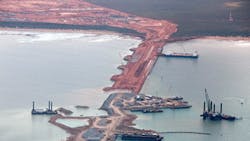Chevron Focuses on Australia, Asia for Natural Gas Markets
Energy producers have created quite a buzz throughout North America with the expansion of natural gas production from shale plays. The payoff for manufacturers has been well documented, cutting gas prices for energy-intensive industries and boosting output for oil and gas industry suppliers.
But for the drilling companies, abundant dry gas supplies and falling prices are a recipe for low returns. Chevron Corp. may be less vulnerable than some of its major competitors because of the company's focus on liquefied natural gas developments beyond North America. Chevron has positioned itself to supply LNG in high-demand Asian markets with its vast resources in offshore Australia.
In December, the San Ramon, Calif.-based company began construction on its massive US$29 billion Wheatstone LNG project in Western Australia. The company has already signed 20-year contracts to supply power companies in Japan with Wheatstone LNG. Chevron has been one of the top-performing oil stocks for the past five years because of its focus on oil production and premium-priced LNG for eastern markets, says Fadel Gheit, a leading oil and gas industry analyst with Oppenheimer & Co. Most of the companies that bet big on natural gas in the United States have lost, Gheit says.
"Outside of the U.S., natural gas is Chevron's growth engine," Gheit says. "But inside the U.S. it's taken a very minor role. It's exceptionally small relative to its peers."
A more balanced portfolio helped Chevron move from ranking near the bottom among its peers in a 2002 Woods Mackenzie exploration value creation study to one of the top companies in 2011, according to Bobby Ryan, Chevron's vice president of global exploration, during a Credit Suisse energy summit on Feb. 8. The company's exploration focus areas comprise the deepwater Gulf of Mexico, Northwest Australia and the western coast of Africa, Ryan says.
Safety and Environmental Concerns
Chevron CEO John Watson was one of several competing oil company executives who was critical of the way BP Plc handled its 2010 Gulf spill. In the aftermath, Chevron launched an ad campaign called "We Agree" that sought to convey the company's commitment to social and environmental responsibility. After the Brazil incident, Watson said during the company's Jan. 27 earnings call that Chevron didn't put its "best foot forward in some of the communication it made at that time."
While unfortunate, the accidents were unusual for Chevron and probably received more attention than they would have in the past because of the BP disaster. But the company should have learned at least one lesson, says Gheit: "If you live in a glass house, don't throw stones at your neighbors."
See Also:
Panel Protects Chevron in Ecuador Case
About the Author
Jonathan Katz
Former Managing Editor
Former Managing Editor Jon Katz covered leadership and strategy, tackling subjects such as lean manufacturing leadership, strategy development and deployment, corporate culture, corporate social responsibility, and growth strategies. As well, he provided news and analysis of successful companies in the chemical and energy industries, including oil and gas, renewable and alternative.
Jon worked as an intern for IndustryWeek before serving as a reporter for The Morning Journal and then as an associate editor for Penton Media’s Supply Chain Technology News.
Jon received his bachelor’s degree in Journalism from Kent State University and is a die-hard Cleveland sports fan.
